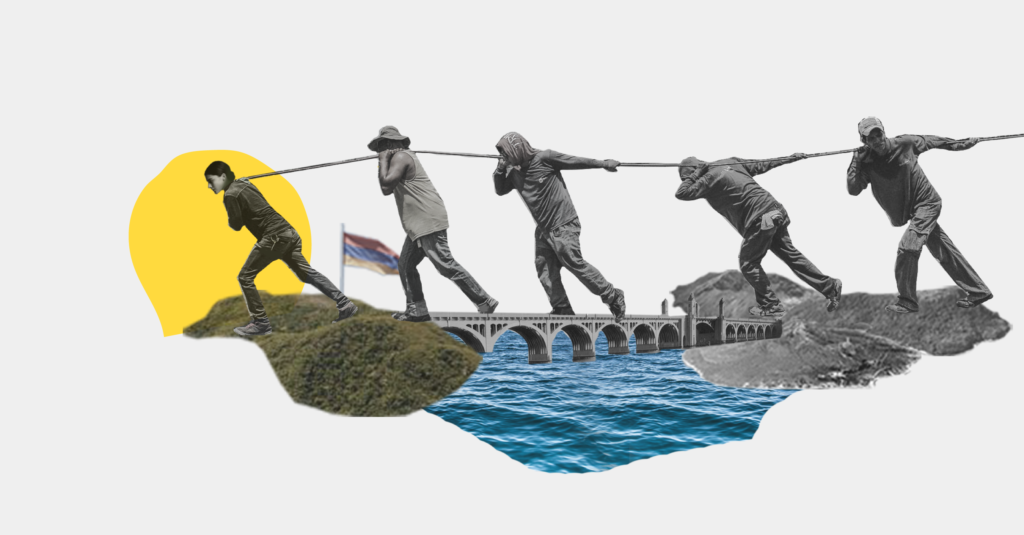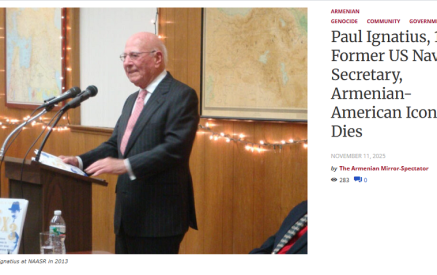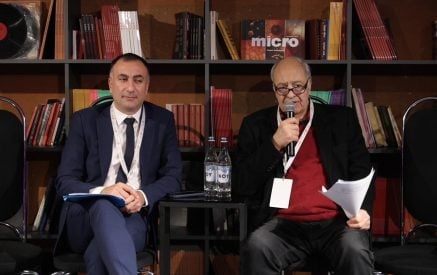by Stepan Piligian
I would like to begin this week’s offering with a sports analogy. The greatest players in all of the major sports will tell you that nothing is static. Achieving success is a chess game of observing, learning and adjusting.
A baseball player will find success, only for a pitcher to discover and take advantage of one of their weaknesses. The batter, despite extraordinary skills, must adjust or fail. Successful players study their losses and make meaningful adjustments. Football teams famously use half time to review their performance so far and make changes for the second half.
Read also
The world of geopolitics operates in a similar way, regardless of moral correctness or criminal behavior. Our enemy made more adjustments than the Armenians, and it resulted in brutal territorial gains. Nearly 30 years ago, after the ceasefire ended the first Artsakh war in 1994, Azerbaijan was a defeated nation. The aggressor was militarily defeated in Artsakh and lost the now infamous seven liberated territories. Yet Azerbaijan didn’t behave as a defeated nation. It rebuilt its military with a significant investment from fossil fuel dollars (which means blood is on the hands of Israel and western consumers) and the military support of Turkey (NATO training and hardware at work).
The result was a superior military, combined with a brazen disregard for international law. Azerbaijan achieved a military victory, despite the paper pledges of all parties to seek non-military solutions. We spent our time on corruption, conflict resolution and pseudo diplomacy. They adjusted to take advantage of a profound reality of global ambivalence.
Armenia has been in a political scissor jack for decades. It emerged independent at a price. The dissolution of the Soviet Union created dysfunctional ethnic republics with little economic viability and the scars of unresolved conflicts temporarily smothered by Soviet authority.
The Artsakh conflict was not unique when observing Chechnya, eastern Ukraine, western Georgia and the former Yugoslavia. Armenia’s republic was born militarily and economically dependent on Russia, with a blockade on its western and eastern borders. Russia, through the Commonwealth of Independent States (CIS), exploited Armenia’s vulnerability by guarding the Turkish border as if the Soviet borders still existed.
A few oligarchs emerged to reap the benefits. Armenia was left with poverty and monopolies, making adjustments to democratic institutions and a market economy challenging. Some reforms were achieved through European engagement and Armenians’ entrepreneurial instincts. Yet reform was slow in the national security domain, specifically intelligence services and the military. Armenia continued its over-dependence on Russia and has paid a dear price.
Some Armenians have a nostalgic perspective of Russia, thinking of the Soviet era when central planning kept people employed and food on the shelf. When you are hungry and unemployed, democracy is not always appreciated. The Soviet era created a mentality of dependence in Armenia. When it is in the psyche of the people to wait for assistance, bold leadership is required to achieve change.
On the other hand, Azerbaijan is a dictatorship, and decision-making is a fairly simple process in an autocratic society. Democracy enables the best of a society’s capabilities, but it has a significant learning curve and can be messy. Decision-making, even with a dominant parliamentary party, must be collaborative, and the Armenian opposition has been ineffective in providing legislative balance.
Similar to the political divide in the United States, opposition tends to take on an obstructionist perception. Perhaps most important is keeping the will of the people aligned and engaged in the affairs of the nations. Many Armenians believe they have little impact on outcomes. With the constant barrage of losses over our history, we have assumed a victim mentality that manifests itself in anger and blaming others. Regardless of where responsibility lies, victims are not productive in evaluating their choices and making appropriate adjustments.
The Armenian diaspora is the other variable in this equation. For decades, the diaspora has operated as a series of hundreds of institutions and organizations in a number of host countries around the world. This decentralized silo model worked well in building diaspora communities and sustaining their existence, even during the early years of the current Armenian republic. There was little need for a highly-effective integrated plan, and each group carved out a niche of needs. There was room for inefficiency given the overwhelming voids. The environment has matured as nation-building has improved. Despite the continued challenges of national security in Armenia, the economy and societal barometers have improved. Recently, the Armenian economy was forecasted to grow a robust seven-percent this year, outperforming neighboring countries.
A new model, however, with increased integration to deliver resources in an efficient manner is required to sustain Armenia’s survival. How can the diaspora deliver at a higher yield when it operates as hundreds of independent groups, each seeking different areas of impact? Certainly this model will continue to assist the homeland, but we should have higher expectations given the perilous status of Armenia’s sovereignty.
The vast capability of the diaspora, in both human and financial capital, could make a significant difference, with private/public partnerships scaling defense technology development and a broader base for intelligence and diplomatic missions. How do we know that the correct buttons are being pushed? Is the diaspora even positioned for self-evaluation and adjustments? If we look at the diaspora from Armenia’s perspective, is it easy to engage and flexible enough to adapt? Probably not. We do what we think is right with a pure heart, but that may not be good enough. We need a more sophisticated relationship between Armenia and the diaspora.
The Armenian National Committee of America and the Armenian Assembly work tirelessly on behalf of Armenian rights. How do we know that they are focused on the issues most important to representatives of Armenia? Are they an extension of Armenia’s foreign policy or quasi-independent groups working on behalf of Armenian Americans? It would be helpful for those parties to provide more transparency on these questions. Adjustments are a necessity in a dynamic world.
We have suffered huge losses, and our anger is evident. Here in the U.S., loyal Armenian American citizens are frustrated with the rhetoric and inaction of the U.S. administration. Our focus has been primarily on elected officials in Congress, with strong relationships built through public commentary, congressional hearings and Armenian Congressional Caucus continuity. Most Armenians are very happy when their members of Congress speak out for Armenia. Is this pride or political naivety? Other than passing budgets that include support for Armenia, which is important, the work of Congress on foreign policy is non-binding, except in declaring war. We have heavily invested in congressional relationships, yet they have structural shortcomings, since foreign policy is driven by the executive branch through the State Department. The latter also relies on Washington think tanks and public relations firms to supplement input. Again–adjustments should be considered. Is there a process for such an assessment? Is there a desire, or are we satisfied by rationalizing that we were outspent by the Azeris or for other reasons we deem out of our control?
I have always felt disappointed that the relationship between Armenia and the diaspora is not stronger. This comment is usually met with defensive micro examples or blaming the other party. It is not enough to say that AGBU or the Armenian Relief Society has an office in Armenia. How much of the diaspora’s capability is being utilized, and what are the obstacles to optimization? The sad irony is that there is a mutual dependency. The homeland can offer the identity for the diaspora’s survival, and the diaspora can offer Armenia incredible support. It is a marriage that should be built to last. We should have a relentless pursuit of that goal. We have good organizations, but the organization is not the end point. The mission of a prosperous and secure homeland is what matters. Efforts to better integrate the diaspora have been about, “I’m okay, but maybe you aren’t.” Our silo mentality, through decades of organizational culture, needs revision. Pan-Armenian actions will put our membership in organizations in the proper perspective to act as an efficient and effective global nation.
The time for division and suboptimal approaches has passed. It is dangerous for us to sit idly by and miss opportunities to adapt to our environment. Change usually comes about when visionary leaders with influence come forward.
Perhaps the Future Armenian is a vehicle to support and mature our engagements. Everyone has a solution. We need to subordinate our egos and build a consensus to address the challenges. In times of crisis, we must do two things–put aside our differences and let our love of the homeland prevail. We must open our minds to new approaches to change the results. Do we have the will to build a new vision?


























































